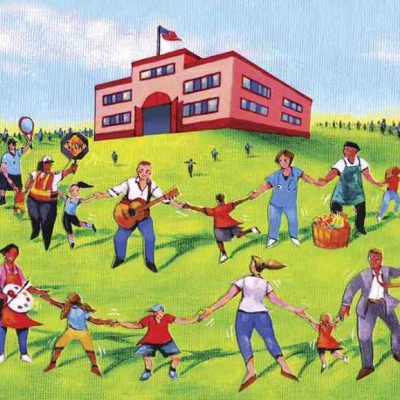Out of the shadows, into the light: A reimagining of African American history
As the teacher is talking, I suddenly feel a whirlwind of emotion hit me. I am no longer in history class, but instead, I am surrounded by the rich history of pre-colonial Africa, exploring the trade routes carved out by the Kongo kingdom and so much more. Suddenly, I am snapped out of my daydream and brought back to reality. Only left with a yearning for my class to dive into the culture, outfits, and economic prosperity of pre-colonial Africa. However, all I get is the basic story of enslavement. I fully understand that slavery, racism, and discrimination are parts of African American history, but they should not be the only part of African American history.
The African American history that I was taught always started with slavery and nothing more. As an attempt to further my understanding of Black history, I wanted to learn about the hidden side of African history. More priority should be put on teaching African history the right way so that people won’t have to do extra research to learn what should be common information.
Abigail Tatambo, a sophomore college student at Boston University, notes that African American history she learned in high school was, “Slavery and Jim Crow based.” That is a common experience shared by many in the U.S. education system.
Tatambo currently majors in Health Science but she feels that she is an African American study major at heart. Tatambo is also a member of UMOJA, the black student union at Boston University. Even though she doesn’t major in African American studies, she sometimes sits in on lectures for an African religions course one of her friends is taking to further her knowledge of Black history. In one of the lectures that Tatambo attended, she learned that societies fail to understand “African spiritual religions before colonialism were actual religions.” Her sharing this memory with me furthers the point that not enough African history is taught. The lack of education in this area essentially erases the history of traditional African religions like Ifa, Santeria, Vodou, and Hoodoo by making them seem less valuable compared to more popular religions like Christianity and Islam.
Before my interview with Tatambo, I had done some research to figure out the status of African history in the whole of the U.S. According to the Princeton Summer Journal, Eunice Choi shares an important point, “Research from the SPLC further reveals…40 percent of teachers believe that states do not provide sufficient support to this instruction.” Overall, the entire U.S. is slacking on African American history. Moreover, students are not able to learn African American history in full if teachers don’t have the proper materials.
Tatambo had a different experience with African American history education because she had done debate with the focus being how debate spaces should focus more on Black women. As a result, Tatambo learned about Black and African cultural history through the research she would do on her own. However, it wasn’t always easy to find and consume this information. “It would take me days to understand what they’re saying because it’s such like heavy text.” While Tatambo was researching, it would take her days to read the text since they were extremely dense, but the average normal person does not have time to take days to read a text. Furthermore, black history is not accessible to the public because the info is not made in a digestible way that is easy to understand after one read. Debate was an extracurricular activity that Tatambo did and that helped her further her knowledge of black history. However, debate is not something every student can or wants to do, but that doesn’t mean that those students don’t want to learn about Black history. Tatambo shouldn’t have had to do an extracurricular just to learn about Black history because schools should be able to provide that curriculum.
Additionally, Slavery and Jim Crow should not be all of black history because it denies the existence of cultures that were and still are present in the world. Astonishingly, a few days of research taught me more about African history than my 10 years of schooling. For example, I learned about the Kongo kingdom which specialized in trade routes for ivory, copper, raffia, cloth, and pottery. I also learned about the Mali empire, an ancient empire in West Africa, that made the first accurate astronomical calendar and traded gold, cotton, and live animals.
The active dismissal of Black history creates a negative connotation of Black history. For Tatambo, she saw the benefits of learning Black history, “It put a lot of pride in me and I just see how, like, people didn’t get that in high school.” For young black Americans being taught their starts at slavery, it is devastating because how can they be proud to Black when society is trying so hard to erase their history?
Black history should be accessible, teachers should have the right materials, and the starting point should not be slavery. I realized that history is important to me because you need the past to understand the present. If people knew pre-colonial African history it would be easier to understand the complexities of slavery and even what is happening in the present. Putting more emphasis on Black history will be empowering for black students and change the perception of people of African descent.









